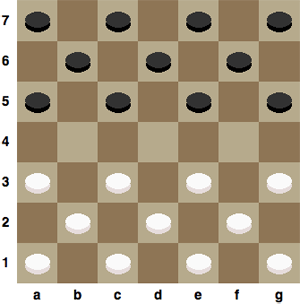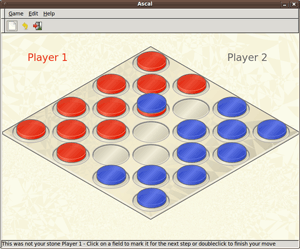Computer Lasca
This page gives information about programs for playing Lasca against the computer, and servers for playing Lasca against other players over the Internet.
Current programs
Peter Billam's JavaScript Lasca program
A JavaScript program to allow you to play Lasca against the computer has been written by Peter Billam in Australia:
It is available at:
http://www.pjb.com.au/laska/play_laska.html
It searches one move deep, with a static evaluation, but all forced sequences are followed to their ends.
Ascal - a Gnome Lasca program
Ascal was programmed by Patrick Haase, Nils Kanning, and Steffen Klemer while students at the University of Goettingen, Germany, for an AI contest in the university course of C++ programming in Summer 2006. Home page:
Version for Ubuntu:
http://www.playdeb.net/software/Ascal
On-line Lasca playing
ig Game Center
An on-line version of Lasca is available at ig Game Center:
http://www.iggamecenter.com/
Historical programs
Steven Lomas, University of Auckland, New Zealand (1986)
Steven Lomas, Postgraduate project, 1986: Operating system design. Steven wrote a programme to play Lasca. It used a straightforward minimax algorithm with lookahead, and performed quite well.
S. Lomas : An intelligent Lasca game playing programme (1986).
Graham Hood, University of Auckland, New Zealand (1992)
Graham Hood, Graduate Project, 1992: Artificial intelligence in playing board games.
Graham wrote a programme to play Lasca. It could be used at various levels of look-ahead, and its performance varied from blindingly fast but stupid to excruciatingly slow but really rather clever. He had hoped to experiment with different strategies, but unfortunately there wasn't enough time. He did achieve a very smooth interface.
G. Hood : An intelligent Lasca-playing programme (1992).
Bruce Wilford, UCL
While a 2nd year student at UCL, Bruce Wilford wrote a Unix-based Lasca-playing program.
The program uses a quite standard mini-max technique. It grows the game tree as it goes, so that moves are searched in the order that previous moves suggested would yield the best results. It varies the lookahead level based on available memory and time, so it plays fairly quickly.


